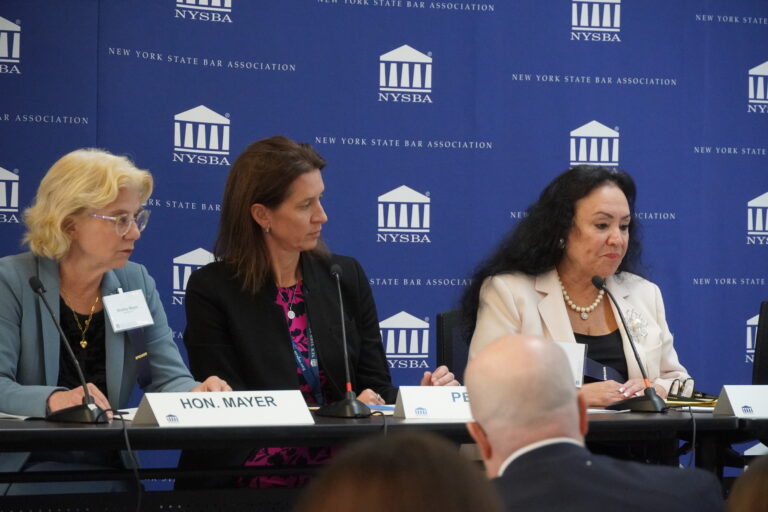Expansion of Civic Readiness Program Needed in New York’s Schools
10.21.2025
 (L-R) Sen. Shelley Mayer, NYS United Teachers union President Melinda Person and NYS Education Commissioner Betty Rosa.
(L-R) Sen. Shelley Mayer, NYS United Teachers union President Melinda Person and NYS Education Commissioner Betty Rosa.
A panel of state education leaders assembled by the New York State Bar Association to discuss the issue of media literacy agree that promoting civic readiness is essential, but challenges persist in making the programs available to all students.
“Social studies is being marginalized,” said Melinda Person, president of the New York State United Teachers union. “It’s not a priority. No Child Left Behind put emphasis on ELA and math scores as a sign of success.”
Person is referring to the federal education policy during the George W. Bush administration that measured a school’s success through standardized testing of English and math. She said it relegated other subjects to a lower priority.
In an effort to improve civic education, the New York State Education Department launched a pilot program called the Seal of Civic Readiness in 117 high schools in 2021. To earn the seal, students must take advanced social studies courses or electives and participate in service learning or projects that promote civic engagement. Now offered statewide, just over 500 high schools participate in the Seal of Civic Readiness program. This is roughly one third of the state’s 1,800 public high schools.
“Civic readiness embraces an understanding of government and the responsibilities of being a citizen,” said Education Commissioner Betty Rosa. “It involves critical thinking, problem solving and analysis. We are not celebrating this work enough.”
While highlighting the success of the program, Commissioner Rosa admits that it needs more vigorous promotion.
“We are focusing on getting this to more schools, especially in rural schools. This is the future for our children; we need to make the investment,” she said.
The union president agreed that funding is an issue and highlighted a grant program offered by the teachers union to help districts offer a Seal of Civic Readiness program. In addition, the union is sharing a free civics curriculum for educators with games and activities for the students in the lower grades.
Person recounted a recent lesson she attended while working as a substitute teacher in a third-grade class. During library time, the media specialist taught a lesson on media disinformation and how to spot an online troll.
“Media literacy is literacy and it’s important in all subject areas,” said Person. “Students need these skills early and often.”
Panelists agreed that the positions of library media specialists — the staff tasked with teaching media literacy – are often eliminated in favor of other school budget priorities.
State Sen. Shelley Mayer said she favors increased funding for media specialists in schools. She acknowledges that new state funding is difficult to get approved in the legislature but recent successes with the cell phone ban in schools and universal free meals are a positive sign.
“They are a concrete step to better conversations,” she said.
The panel was part of a daylong event “Media Literacy Education: Safeguarding Democracy in a Digital World” sponsored by the New York State Bar Association’s Law, Youth and Citizenship Committee.
